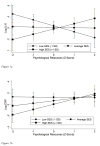Socioeconomic status, psychological resources, and inflammatory markers: Results from the MIDUS study
- PMID: 27280368
- PMCID: PMC5067959
- DOI: 10.1037/hea0000392
Socioeconomic status, psychological resources, and inflammatory markers: Results from the MIDUS study
Abstract
Objective: Our objective was to investigate interactions of psychological resources and socioeconomic status (SES)-as well as potential gender differences and the explanatory role of childhood and adult stress exposures, health behaviors, and negative and positive affect-in predicting markers of systemic inflammation.
Method: We utilized a sample of adults from the Midlife Development in the U.S. (MIDUS) study who provided biomarker data (N = 1,152). SES was operationalized as a composite of education, income, and occupational prestige, and the psychological resources construct was operationalized as a latent factor measured with optimism, perceived control, and self-esteem. Linear regression models examined these 2 factors and their interaction in predicting interleukin-6 (IL-6) and C-reactive protein (CRP) measured on average 2 years later, as well as 3-way interactions involving gender and the impact of covariate adjustment.
Results: Psychological resources interacted with SES in men (for IL-6: p < .001; for CRP: p = .04) but not in women. In men, greater psychological resources was associated with lower concentrations of IL-6 at lower levels of SES but higher concentrations of both markers at higher levels of SES. The inverse association between resources and IL-6 at low SES was moderately attenuated upon adjustment for negative affect.
Conclusion: Socioeconomic status might modulate the linkage between psychological resources and systemic inflammation in men. At lower levels of SES, resources may be related to lower inflammation in part through lower negative affect. Associations with higher inflammation at higher SES add to growing evidence suggesting that adaptive psychological characteristics may be associated with markers of poorer physiological function under certain conditions. (PsycINFO Database Record
(c) 2016 APA, all rights reserved).
Conflict of interest statement
Conflicts of Interest: None declared.
Figures
Similar articles
-
Socioeconomic Status Interacts with Conscientiousness and Neuroticism to Predict Circulating Concentrations of Inflammatory Markers.Ann Behav Med. 2017 Apr;51(2):240-250. doi: 10.1007/s12160-016-9847-z. Ann Behav Med. 2017. PMID: 27738972 Free PMC article.
-
Community socioeconomic status is associated with circulating interleukin-6 and C-reactive protein.Psychosom Med. 2008 Jul;70(6):646-52. doi: 10.1097/PSY.0b013e31817b8ee4. Psychosom Med. 2008. PMID: 18606725
-
Association of socioeconomic status with inflammatory markers: a two cohort comparison.Prev Med. 2015 Feb;71:12-9. doi: 10.1016/j.ypmed.2014.11.031. Epub 2014 Dec 5. Prev Med. 2015. PMID: 25482420
-
Childhood socioeconomic status and inflammation: A systematic review and meta-analysis.Brain Behav Immun. 2019 May;78:161-176. doi: 10.1016/j.bbi.2019.01.018. Epub 2019 Feb 7. Brain Behav Immun. 2019. PMID: 30738842
-
[Socioeconomic status and inflammatory biomarkers of cardiovascular diseases: How do education, occupation and income operate?].Herz. 2015 May;40 Suppl 3:298-304. doi: 10.1007/s00059-013-4040-7. Epub 2014 Jan 23. Herz. 2015. PMID: 24448985 Review. German.
Cited by
-
Socioeconomic Status Interacts with Conscientiousness and Neuroticism to Predict Circulating Concentrations of Inflammatory Markers.Ann Behav Med. 2017 Apr;51(2):240-250. doi: 10.1007/s12160-016-9847-z. Ann Behav Med. 2017. PMID: 27738972 Free PMC article.
-
Sense of purpose in life and inflammation in healthy older adults: A longitudinal study.Psychoneuroendocrinology. 2022 Jul;141:105746. doi: 10.1016/j.psyneuen.2022.105746. Epub 2022 Mar 25. Psychoneuroendocrinology. 2022. PMID: 35364478 Free PMC article.
-
Childhood adversity and mechanistic links to hypertension risk in adulthood.Br J Pharmacol. 2019 Jun;176(12):1932-1950. doi: 10.1111/bph.14576. Epub 2019 Mar 3. Br J Pharmacol. 2019. PMID: 30656638 Free PMC article. Review.
-
NMDA receptor hypofunction for schizophrenia revisited: Perspectives from epigenetic mechanisms.Schizophr Res. 2020 Mar;217:60-70. doi: 10.1016/j.schres.2019.03.010. Epub 2019 Apr 9. Schizophr Res. 2020. PMID: 30979669 Free PMC article. Review.
-
Optimism and Healthy Aging in Women and Men.Am J Epidemiol. 2019 Jun 1;188(6):1084-1091. doi: 10.1093/aje/kwz056. Am J Epidemiol. 2019. PMID: 30834429 Free PMC article.
References
-
- Albus C. Psychological and social factors in coronary heart disease. Annals of Medicine. 2010;42(7):487–494. - PubMed
-
- Baum A, Garofalo JP, Yali A. Socioeconomic status and chronic stress: Does stress account for SES effects on health? Annals of the New York Academy of Sciences. 1999;896(1):131–144. - PubMed
-
- Bjarnason-Wehrens B, Grande G, Loewel H, Voller H, Mittag O. Gender-specific issues in cardiac rehabilitation: Do women with ischaemic heart disease need specially tailored programmes? European Journal of Cardiovascular Prevention and Rehabilitation. 2007;14(2):163–171. - PubMed
MeSH terms
Substances
Grants and funding
LinkOut - more resources
Full Text Sources
Other Literature Sources
Medical
Research Materials
Miscellaneous


